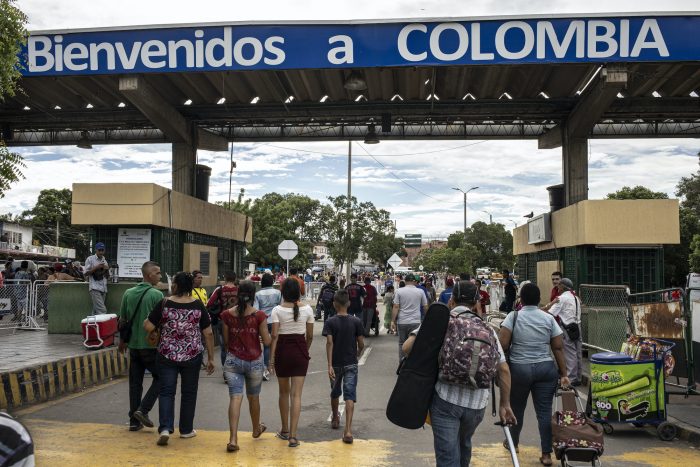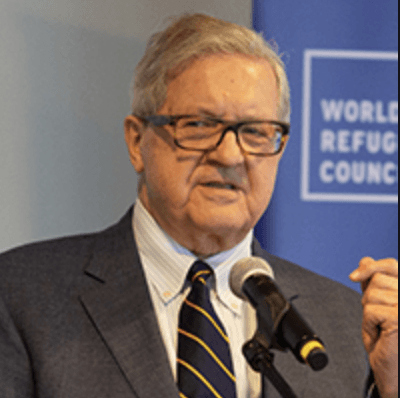Madeleine Albright, Lloyd Axworthy, Mayu Brizuela de Ávila, Fen Osler Hampson
This article was first published in The Globe and Mail.
In their postinauguration call, President Joe Biden and Prime Minister Justin Trudeau pledged to deepen co-operation between the United States and Canada on a host of global challenges. But the two leaders need not look far for problems to address. In our own hemisphere, the crisis in Venezuela and the forcible displacement of Central Americans fleeing violence and natural disaster present critical opportunities for Canada and the U.S. to work together.
Gang warfare and endemic violence are the major cause of displacement for more than 500,000 people who have been forced from their homes in Guatemala, Honduras and El Salvador. A concerted regional effort must address this crisis. Under pressure from former U.S. president Donald Trump, Mexico blocked caravans and closed its borders. Another estimated 67,000 people are stranded at the U.S.-Mexico border. Working together with Mexico, Canada and the United States should jointly develop a resettlement plan, one that assists women and children, who are the most vulnerable. As Mr. Biden has already said, the deeper roots of displacement must also be addressed through a major program of development assistance that alleviates poverty and promotes human security, climate adaptation and good governance.
In Venezuela, more than five million people have been forced to flee to neighbouring countries. This number is projected to increase substantially in the near future, with the Maduro regime failing to provide basic health services in the middle of a raging pandemic. Gender-based violence is also on the rise. Large numbers of children have been separated from their families. Trafficking of women and girls is growing exponentially. The drug cartels are running amok.
The crises in Venezuela and Central America are calling out for a more co-ordinated and constructive approach. This is the moment for our leaders to pursue one.
Meanwhile, President Nicolas Maduro is consolidating his position, despite fraudulent elections and a battery of sanctions that have been placed on his regime. Efforts by other countries to promote a diplomatic solution leading to a peaceful transfer of power through free and fair elections have not yet led to a breakthrough.
Mr. Maduro’s regime is being propped up by sales of so-called “blood gold” mined in jungles of Venezuela’s Amazon basin that finds its way into international markets via the Bahamas, Ireland, Morocco, Dubai and especially Turkey, which has a close relationship with the Maduro regime.
Narco-trafficking by Mr. Maduro’s top military leaders is another source of much-needed revenue. And despite an international sanctions regime, Venezuelan oil still manages to find its way into international markets with the assistance of Iran, Russia and China.
As a result of Magnitsky-style sanctions in the U.S. and Canada, which have frozen Mr. Maduro’s ill-gotten gains, much of that money is now flowing into bank accounts in Spain, Switzerland and points beyond. Swiss officials estimate there are US$10.1-billion in embezzled public funds scattered in bank accounts in Switzerland.
The first donor conference in support of Venezuelan migrants was held in May, 2020, and succeeded in raising commitments of US$2.79-billion. At that time, the Canadian government agreed to host and organize the follow-up to this conference. Working with the Biden administration, the Canadian government should mount a major diplomatic effort to strengthen not just the humanitarian response to the Venezuelan crisis, but also the creation of a new multistakeholder regional network.
The U.S. and Canada should work together to mobilize the Organization of American States (OAS), notwithstanding the fact that Venezuela and its regional allies (Bolivia, Cuba, Nicaragua and a number of small Caribbean states) would frustrate diplomacy. However, as those of us who served as foreign ministers can attest, when the OAS decides to act, it can be effective. The forceful defence of democracy and human rights in Haiti, Peru, Guatemala and Paraguay in the 1990s was effective, even when potential spoilers stood in the way.
Canada and the U.S. can show they mean business by repurposing the Maduro regime’s frozen assets, including the millions if not billions that sit in bank accounts in Miami, Europe and Canada, to assist forcibly displaced Venezuelans in Colombia and elsewhere. A global effort to ban the trafficking and sale of “blood gold,” akin to the successful effort led by Canada in the 1990s to ban the sale of “blood diamonds” in Africa, should also be pursued.
Throughout our careers, we have seen the difference that U.S. and Canadian leadership can make at critical junctures. The crises in Venezuela and Central America are calling out for a more co-ordinated and constructive approach. This is the moment for our leaders to pursue one.




